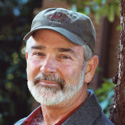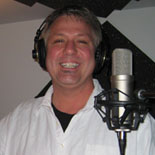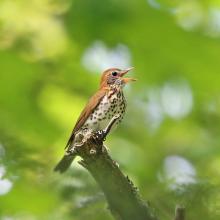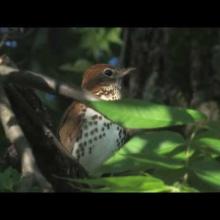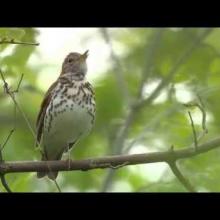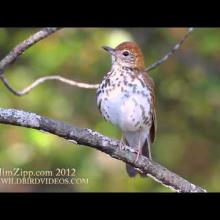

Join BirdNote tomorrow, November 30th!
Illustrator David Sibley and actor H. Jon Benjamin will face off in the bird illustration battle of the century during BirdNote's Year-end Celebration and Auction!
In June 1853, Thoreau wrote of an enchanting encounter with the Wood Thrush: "This is the only bird whose note affects me like music. It lifts and exhilarates me. It is inspiring. It changes all hours to an eternal morning." Wood Thrushes thrive in large expanses of forest. And their numbers have declined as forests have been cut on their breeding grounds. Protected areas like Adirondack Park, Great Smoky Mountains National Park, and Ozark National Forest give them a chance to thrive. Let your elected officials know that you support funding of national parks and refuges!
Today's show brought to you by the Lufkin Family Foundation.
BirdNote®
Henry David Thoreau and the Wood Thrush
Written by Bob Sundstrom
This is BirdNote!
[Wood Thrush song]
Perhaps as much as any man, Henry David Thoreau enjoyed his walks in the woods. In June 1853, Thoreau wrote in his journal of an enchanting encounter with the Wood Thrush:
“The wood thrush launches forth his evening strains from the midst of the pines. [Wood Thrush song throughout quotation] I admire the moderation of this master. There is nothing tumultuous in his song. He launches forth one strain with all his heart and life and soul, of pure and unmatchable melody, and then he pauses and gives the hearer and himself time to digest this, and then another and another … ” *
About a week later, Thoreau wrote again of the Wood Thrush: “This is the only bird whose note affects me like music … It lifts and exhilarates me. It is inspiring . . . It changes all hours to an eternal morning.” **
[Wood Thrush song]
Wood Thrushes thrive in large expanses of forest. And their numbers have declined as forests have been cut on their breeding grounds and where they winter, in southern Mexico and Central America. Yet nearly half of Wood Thrush pairs have two broods per nesting season, so given a chance, their numbers could rebound. Protected areas like Adirondack Park, Great Smoky Mountains National Park, and Ozark National Forest give them that chance.
Today’s show brought to you by the Lufkin Family Foundation. I’m Michael Stein.
###
Song of the Wood Thrush provided by The Macaulay Library at the Cornell Lab of Ornithology, Ithaca, New York. Recorded by G.F. Budney.
Producer: John Kessler
Executive Producer: Chris Peterson
© 2014 Tune In to Nature.org June 2018/2019 Narrator: Michael Stein
ID# SotB-WOTH-02-2011-06-05
Quotations from: Henry David Thoreau “Thoreau and the Birds”. In Hay, John (editor). The Great House of Birds. San Francisco: Sierra Club Books, 1996. p. 69-70. *June 14, 1853 **June 22, 1853


